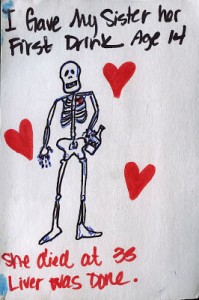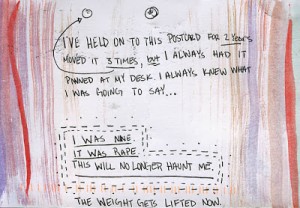Reflections: CAP, Sex Workers, and Identity
I think it is fitting that my last blog post for this class will focus on two of the abstractions we have focused on throughout this year. The two being sex work and Canadian multicultural identity. It has been a long 8 months at UBC and half of me is looking forward to summer and the other half is in shock that I am done my 1st year at university and that much closer to “real life.” On April 4th I attended the Coordinated Arts Program Conference and these are some of my thoughts.
One of the panels I had the chance of going to was “Race and Globalization.” The panellists brought up some very interesting ideas of race internationally specifically I enjoyed the presentation by Helen Wagner talking about commodification of indigenous people in photographs. It was really interesting to see how her stream, Law & Society, directly addressed something we had talked about back in first term with Whitlock.
However, what I want to talk about was Suzanne Ross’ presentation on Sex Work. What struck me in the beginning was her clear differentiation between prostitutes and sex work. She decided to use “sex work” in her presentation due to the gendered and negative connotations behind prostitution. Additionally, she said that she chose that word because it is an all-encompassing word that describes anyone that performs sexual services. This could be an exotic dancer or someone who sells sex for money. This then unites these people in some of the issues they may face together. When I heard this definition it immediately brought up concerns for me. My question behind this word was whether we should generalize, or group up, these different types of professions into one label? I imagine that the concerns/issues/privileges of say a stripper is quite different that someone who works the streets. From this year at ASTU I have become aware of the problems with putting a label on a broad group of people. This can be related to how First Nations people are put under one umbrella term when in fact there are hundreds of different nations and cultures in Canada, but they are grouped up due to settler ignorance and a common narrative of cultural genocide. Borrowing from Carter, I’m concerned with labelling a diverse group of people with one label in that it could creates silences in that community. Specifically with what types of people are being represented. An example of this is the cultural association behind the word of “sex work.” Prior to Ross’ definition I had always associated sex work with prostitution. So given my belief I hope you will allow me to make a claim that as society we give voice and recognition (whether that be positive or negative) to those who fit traditional roles of “sex work,” and perhaps leave out and ignore the others that fit into “sex work” as an all encompassing word.
Another panel I had the fortune of attending was the “Canadian Identity and Multiculturalism” roundtable lead by students from the Philosophy, Political Science & Economics stream. They wanted to bring ideas from their POLI 110 class on Canadian Politics to the CAP conference. Some ideas they discussed how it is to be living in Canada as a multicultural country. Many of the panellists were international students (something I’ll discuss later) that addressed how they did not know Canada was such a multicultural society (especially at UBC) and once they came here they were pleasantly surprised. Overall all the panellists had positive experience of Canadian multiculturalism.However I couldn’t help but notice the (ironic) lack of representation of any people who were born and raised Canadian to provide a voice to the panel. Their was one Canadian, but she has only lived here for seven years. While that is still a very important voice to include in a panel (as well as the international student voice) I was left off-put by the lack of representation in that context. This is not to discredit the knowledge that these panellists have on multiculturalism, but I believe that additional voice would have been more beneficial to the discussion.
One of the fallbacks in multiculturalism several of the panellists articulated was the fact that new immigrants tend to self “segregate” themselves into their own cultural enclaves and the fact that immigrants are less likely to interact in politics. When pressed on a explanation on the latter the panellists said something on the lines that immigrants just weren’t interested in politics because they feel that they are not effected by the politics of the country they have moved to. Basically they were arguing that new immigrants were apathetic to politics because they have no (perceived) reason to care about Canadian politics. While this maybe true for some, I am hesitant again to lump that stereotype to all immigrants. Putting on my ASTU hat again I am critical of the systems that are behind that belief that disempower immigrants and that belief that immigrants don’t care actually just further enforces stereotypes. In the context of why immigrants move to enclaves I think it is precisely because the resources and accessibility to move into well established areas is not given to immigrants. Why would you leave your country to buy a $1.3 million house in Vancouver where you will be culturally isolated when you can buy a house in Surrey where it is cheeper and people look and talk like you?
It is no secret that “minority” groups are underrepresented in politics, but rather than being because of immigrant apathy, I am curious to look at the systems that stop immigrants from being informed or eligible for politics. Take for example that the mainstream news is in English (or French), so if those languages aren’t the ones you speak than no surprise that you aren’t interested in politics. Additionally, I would be hesitant to say that immigrants aren’t active in politics as evident by the most important people in my life-my parents who are in fact immigrants as well.
So while many of the streams have shown similarities with ours, I think Global Citizens provides something that perhaps not all the streams are taught. We are taught to see through the obvious. We are taught to see the power that language and words have in our society. We are taught to think about who is being represented, by whom, and how. I believe we are taught these things due to the fact that as Global Citizens the world requires us, and demands of us, to see the complexity behind the issues that face our world. This is not to downgrade or disregard the important work that other streams have done, I just believe that GC focus is on being critical on societal norms which I greatly appreciate. Stop the hegemony!
I’d have to say my experiences in CAP were immensely rewarding. I don’t think I would have liked university as much as I did if it was not for the people I have met and the things I learned. I consider myself a more introverted person and I know I would have had a hard time meeting people in the regular stream, so I am very grateful for the privilege of being in this program. I wish all my fellow colleagues a successful university experience!



